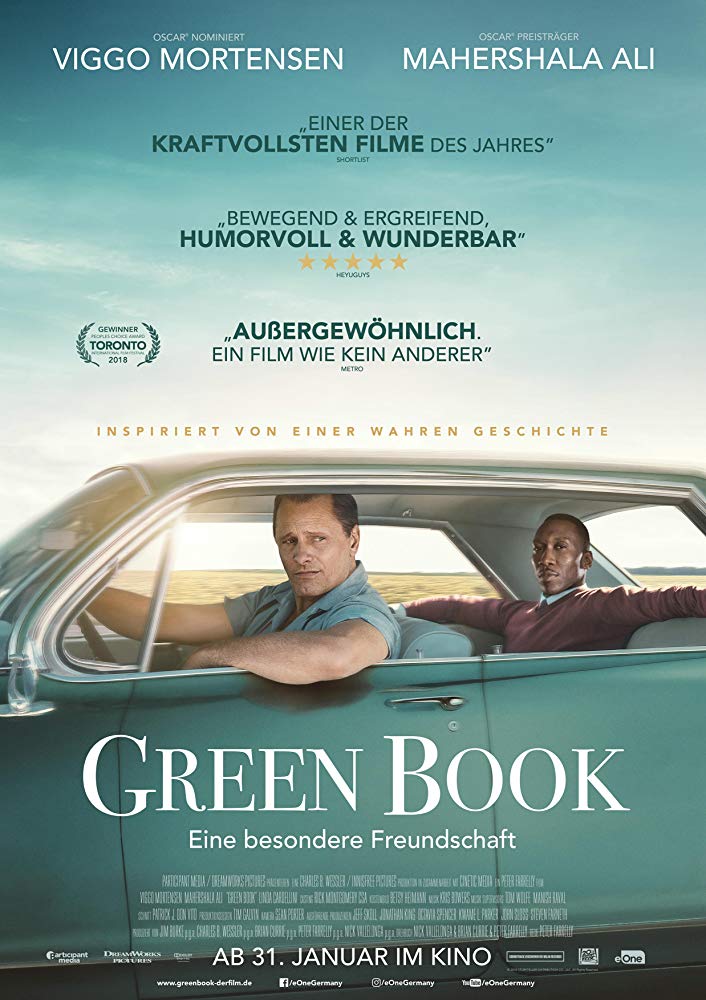 Green Book (Peter Farrelly, 2018)
Green Book (Peter Farrelly, 2018)
 Green Book (Peter Farrelly, 2018)
Green Book (Peter Farrelly, 2018)
A working-class Italian-American bouncer becomes the driver of an African-American classical pianist on a tour of venues through the 1960s American South.
Viggo Mortensen, Mahershala Ali, Linda Cardellini
The story is based, it's revealed at the end of the film, on a real-life relationship, which the film makes into a friendship, between street-wise Frank Vallelonga and educated, wealthy black musician, Don Shirley. It's an odd couple road movie social drama about race relations in the Deep South in the 1960s. You can see why it had a lot going for it to be made as a film — and especially one to be released in the Oscar corridor.
It's a triumph of entertainment over truth. Ars non gratia artis. Not that it's not a very good film. Mortenson's performance in particular is astonishingly good — and true to itself (including change and development in the character), unlike that of Ali. His ambiguous characterisation shifts uneasily between suggesting a camp homosexual to something approaching a civil rights activist, but finishing up being just a good bloke. Most unsatisfactory. Ali won the Supporting Oscar for Moonlight, and has already snaffled the Globes Supporting for this one. I hope the Academy doesn't get sucked in by political correctness - but it probably will.
But, as usual, blame the writer. Or rather writers: three is a crowd. One is the director, who wants to win the Oscar. One is the son of Mortensen's character, which means the point of view is going to be Vallelonga's, as opposed to Shirley's (Ali's character). I suppose the other one is the real writer, who might have been tearing his hair out. While we understand where Vallelonga is coming from, it's not so easy to get a sense of Shirley's back story. The Shirley family were not happy with the film, unlike the Vallelonga family, two or three of whom appear in the credits.
All the techy stuff is good, excellent production design. So it's very successful Hollywood-style entertainment. But a Great Film? Nope.
Green Book is almost a contradiction in terms, a feel-good buddy comedy-drama featuring an elegant black musician and his white driver on tour in the pre-integration South of 1962. Arriving in the wake of any number of edgy cinematic takes on racial issues, this Universal release represents a very middle-of-the-road liberal approach to a story that pretty much could have been told anytime since the 1960s. Distinctive and amusing turns by Viggo Mortensen and Mahershala Ali make Peter Farrelly’s first solo feature outing a lively and likable diversion. ... For this latest physically transformative part, Mortensen has packed on quite a few pounds, adopted a new gait and a perfect Italian-American accent and beautifully sunk himself into the role of a capable, don’t-mess-with-me wise guy. He really zings this performance. Todd McCarthy, Hollywood Reporter.
... a case of a film that’s remarkably conventional and shallow in its treatment of racism, but also an undeniable showcase for two great performers. I walked out of Green Book thinking I had just seen one of the biggest eventual hits of TIFF—this movie has what I would call the '10th Best Picture Nominee' potential a la The Blind Side and The Help in that it’s wildly crowdpleasing with the kind of easy-to-swallow message that a lot of critics will consider pandering and problematic while mainstream America eats it up. I said to someone, 'It’s a movie grandmas will love.' ... There’s nothing challenging about the structure or development of Green Book, and there’s a version of this film that takes more storytelling risks and feels more genuine than this one, which has clearly been designed for mass appeal. Brian Tallerico.
Green Book is also a watchable, seamless film, anchored around the charisma of its two leads, Viggo Mortensen and Mahershala Ali. The narrative follows popular pianist and entertainer Don Shirley (Ali) as he tours the segregated South with Tony [the] Lip [actually Vallelonga] (Mortensen), a hardboiled East Coast Italian, as his driver and bodyguard of sorts. The title comes from the “Green Book” they use to book appropriate (black-friendly) accommodation and dining. It is impossible to remain unmoved during scenes in which the talented Shirley is asked to use an outdoor toilet because he is black, and refused admittance to the restaurant of an establishment in which he is performing, and the relationship that develops between Tony and Shirley is an effective emotional centrepiece for the film. However, its essentially paternalistic approach to race relations – it seems to take the magnanimity of Lip and his family to affirm Shirley’s humanity – and its unbridled sentimentality will raise the eyebrows of anyone with more than a rudimentary knowledge of recent American history and culture. But maybe I am expecting too much from director Peter Farrelly, the writer of inane comedies like Me, Myself and Irene, Shallow Hal and Stuck on You. Ari Mattes, The Conversation.
In telling the story of the brilliant, erudite jazz pianist Don Shirley (Mahershala Ali), who is chauffeured on his Southern concert tour by a rough-edged Italian-American bouncer named Tony “Lip” Vallelonga (Viggo Mortensen), Green Book serves up bald-faced clichés and stereotypes with a drollery that almost qualifies as disarming.
Mortensen and Ali, who won the Oscar for best supporting actor, are superb performers with smooth timing and undeniable chemistry. The movie wades into the muck and mire of white supremacy, cracks a few wince-worthy jokes, gasps in horror at a black man’s abuse and humiliation (all while maintaining a safe, tasteful distance from it), then digs up a nugget of uplift to send you home with, a little token of virtue to go with that smile on your face. Justin Chang, 'Oscars 2019: Green Book is the worst best picture winner since Crash', Los Angeles Times.
Garry Gillard | reviews | New: 13 January, 2019 | Now: 26 February, 2019